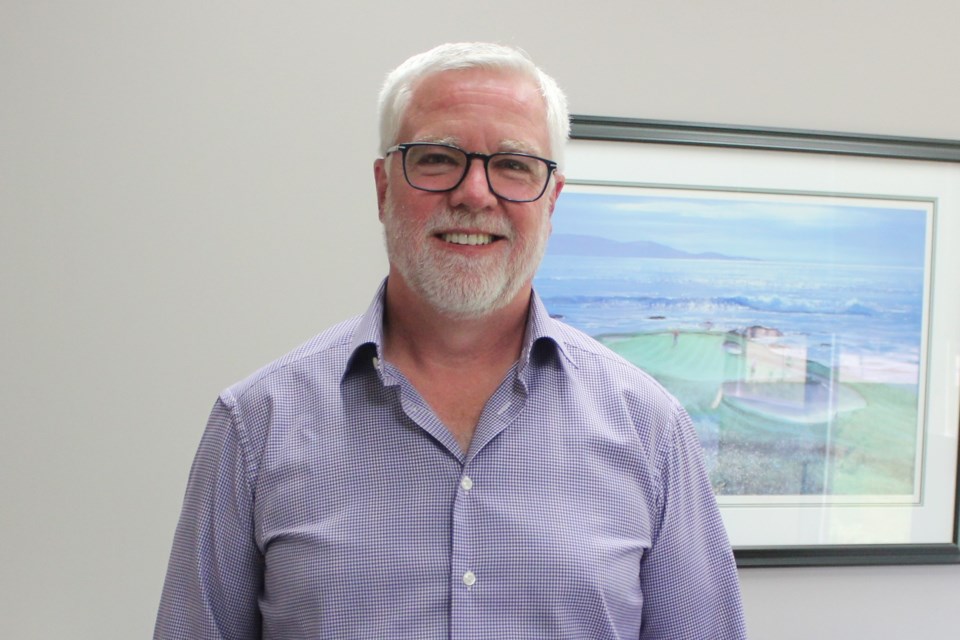As president of Hunter Steel responsible for overseeing five locations in southwestern Ontario, Mark Hunter is accustomed to leading and working with colleagues.
At the company’s head office in Stratford, Hunter told StratfordToday that the qualities that he carries with him in his day job are transferable to those needed, if elected, at Stratford city council.
“The job isn’t to do the day-to-day minutia, but to be involved in setting a path to success going forward,” Hunter said of his thoughts on the role of a city councillor.
Hunter worked summers at Hunter Steel, started by his father, Doug, in 1977 in Stratford. He studied law and practiced in Toronto for several years before seeking a change.
“My dad said why don’t you join the family business?”
Hunter started the company’s Guelph branch. He has been president for the last 12 years and also represents the company as in-house legal counsel. The company also has branches in Woodstock, Brantford and Orangeville and sell mainly locally.
After commuting for a time, he’s lived in Stratford for two years.
“Each branch has a branch manager and they have a fair amount of autonomy in running the day-to-day business. I oversee what they are doing and make sure all of the metrics are right.”
“I give direction because steel is a commodity, the price is up and down, I try to give guidance on that, where we think it is going and how to behave accordingly and sort of direct the broader scope of things. I think that is similar to the role a councillor should play - an overseer and guide the future.”
Hunter said city council needs a good plan of where the city wants to go and a business approach with measurable goals could achieve that. Defining success and having measurable elements is important so everyone knows “where we are going and we can all go in the same direction,” he said.
As president, Hunter said he tries to build consensus and that attribute would serve him well around city council chambers. “I would just be one vote, if elected, and will need to work with others to be effective. I think I do that well.”
Hunter said he has talked to members of the community already about running for council and plans to do some door-to-door campaigning. Admittedly, he is not a big social media user.
Infrastructure, transportation and housing are three keys areas of the campaign, he said.
Roads are a topic that comes up but Hunter would like to take a deeper dive into the city’s infrastructure to see what might need to be improved. He would also like to see the city attract more industry, noting that about 74 per cent of the tax base is generated by residents.
“I would like to see a greater proportion of that from businesses. It gives a better balance. Businesses tend to use fewer services and pay for more. (They are) big revenue generators and job providers. I know there have been attempts to get that done and it’s not easy but it is worth doing.”
Hunter would like to take a look at the city’s transit system and see if there are any efficiencies that could improve it and cut down on costs. Affordable housing, not just social housing, is another important topic, he said.
“It is important for everyone. It’s important for businesses to be able to attract employees. They need to have a place to live. With the price of fuel, it doesn’t make as much sense to commute as it used to. Finding solutions for that will be important.”
Asked for comment about the current council, Hunter said the approach towards the proposed Xinyi Canada Glass project probably could have been handled better, but would have liked to have heard more about the positive aspects.
The project was criticized due to a lack of transparency, including a request to the province for a minister’s zoning order to ensure the land could be used, sidestepping democracy, in the opinion of opposition groups. The project, which would have created hundreds of jobs, ultimately did not move forward.
“No project will be perfect, you will always have to have some trade-offs. I don’t think the public discourse included enough about the positives that were possible, and then let people make up their minds from there.”
“It is hard to comment because I wasn’t in the room, wasn’t part of the decision making process. At the end of the day people are stepping forward representing the community and they have to represent the way they think is best to move the community forward. They are all there trying their best for the city, so I applaud them for that.”
Hunter said ultimately, having a focused plan at city council is important, including long term plans to ensure the city is prepared for situations that could include the impact of climate change.
Read our Stratford municipal election coverage, including features on candidates here: https://www.stratfordtoday.ca/2022-municipal-election-news



